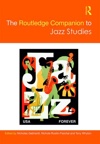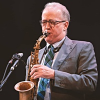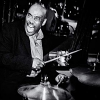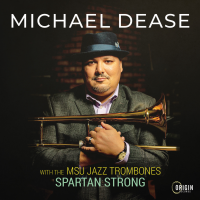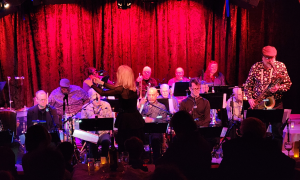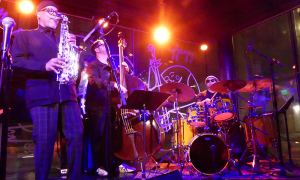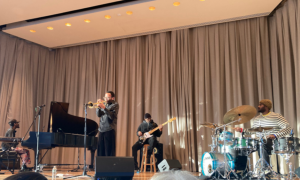Home » Jazz Articles » Live Review » John Richmond at The Turning Point Cafe
John Richmond at The Turning Point Cafe
The Turning Point Cafe
Annual Gemini Birthday Bash
Piermont, NY
June 10, 2019
The night began with a question of the identity of an alto saxophonist on a Miles Davis recording that was playing on The Turning Point Café's sound system. John Richmond, tenor saxophonist and the Monday Jazz Sessions curator, put pre-set preparation on hold, grabbed his cell phone and found a wifi hotspot in the semi-basement space to search for the answer. While several musicians entered the premises with their instruments in anticipation of a jam session following the opening set, John Hart warmed up and, with an air of absolute certainty, offered Jackie McLean's name. After Richmond's query confirmed that Hart was indeed correct, the guitarist added "Let's get this show on the road!" in the direction of bassist Bill Moring and drummer Tim Horner.
Now in it's twelfth season, Jazz at The Turning Point Café is a haven for musicians from the Hudson Valley, northern New Jersey, and New York City, who thrive in the informal atmosphere cultivated by Richmond's deft and genial oversight. Though non-playing audiences turn out in smaller numbers than musicians, those who show up to only listen are treated to jazz played by groups assembled by Richmond in a scene with a refreshing lack of formalities and pretense. Routine announcements and mention of song titles are virtually nonexistent. So are windy tributes to icons from the music's storied past and glib references to jazz as America's Classical Music. No hearty congratulations are given to those present for supporting live music. The groups on stage often take their sweet time deciding on repertoire, keys and tempos. At one point prior to the onset of "Everything I Love," the night's second selection, while the band looked over sheet music Hart joked loud enough for everyone in the room to hear, "Anyone want to help us with this?" and then sang a portion of the tune to his peers.
Perhaps these factors might be less amusing or droll if the music wasn't spot-on. There was absolutely no tentativeness or uncertainty once the group started to play. Richmond, Hart, Moring, and Horner approximated the sound of a working band, in part because of several previous appearances at the TPC. Hart, Moring and Horner have played together since the 1980s, and the bassist and drummer are essential to Hart's recent recordings as a leader, Exit From Brooklyn (Zoho, 2016), and Crop Circles (SteepleChase, 2019).
Time and time again, during the five-selection set it was easy to come to the conclusion that Moring's and Horner's rock solid yet edgy foundation was the key ingredient to the band's sound. During improvisations by Richmond, Hart and alto valve trombonist Scott Reeves (who joined the group about half way through the set), they consistently made an impact. Moring and Horner swung mightily, kept things on course, and, as a rule, didn't get in anyone's way. In addition to a ride cymbal that locked into the bassist's robust lines, Horner displayed a penchant for taking brief liberties that gave the music an extra shot of adrenaline, particularly during Hart's solos. In the midst of "In Walked Bud" and "Everything I Love," several consecutive snare drum accents sounded like a judge wielding a gavel. In other instances Horner had a unique way of briefly attaching himself to the guitarist's phrases, resulting in the two of them fleetingly adding another dimension to the music.
Richmond, Hart and Reeves thrived in the hothouse atmosphere generated by Moring and Horner. Richmond's work was characterized by a driving, clear-cut sense of direction and organization, seasoned with shifts in tone and dynamics, the occasional run of elephantine notes, as well as—during "In Walked Bud" and "Little B's Poem"— briefly giving the impression of flinging terse patterns into the air. Hart's solos were devoid of predictable sequences or devices. Oftentimes it seemed like he was having a conversation with himself and the band at the same time. Single note runs lasted long enough to make an impression and then were truncated. In the middle of "I Want To Talk About You" he gleefully bounced a half-dozen chords off of one another. Sometimes Hart constructed phrases from diverse elements with brief spaces between them. For example, in one instance he executed a prominent, bell-like note; a sudden spritz of chords; and a succinct run of single notes. Reeves is a master of the straightforward, no frills narrative. He sounds as if he prefers speaking deliberately through the horn as opposed to striving to make a visceral impact. One loud, braying, bent note and an insistent, repetitive phrase were the most extroverted elements of his "Turnaround" improvisation.
The Annual Gemini Birthday Bash, Richmond said near the set's end to no one in particular, referred to the fact that his birthday, Hart's, and Moring's are within ten days of one other. Then Hart played what he referred to as the "Happy Birthday" chord. The cue was ignored and no one bothered to sing the song. No matter. It was almost time to relinquish the stage. While the guitarist spelled out the chord sequence to "Turnaround," Richmond scrutinized the room, sized up musicians and their instruments, and mentally began to organize the jam session to follow.
Tags
Live Reviews
John Richmond
David A. Orthmann
United States
New York
New York City
Miles Davis
John Richmond
John Hart
Jackie McLean
Bill Moring
Tim Horner
Scott Reeves
PREVIOUS / NEXT
Support All About Jazz
 All About Jazz has been a pillar of jazz since 1995, championing it as an art form and, more importantly, supporting the musicians who make it. Our enduring commitment has made "AAJ" one of the most culturally important websites of its kind, read by hundreds of thousands of fans, musicians and industry figures every month.
All About Jazz has been a pillar of jazz since 1995, championing it as an art form and, more importantly, supporting the musicians who make it. Our enduring commitment has made "AAJ" one of the most culturally important websites of its kind, read by hundreds of thousands of fans, musicians and industry figures every month.



